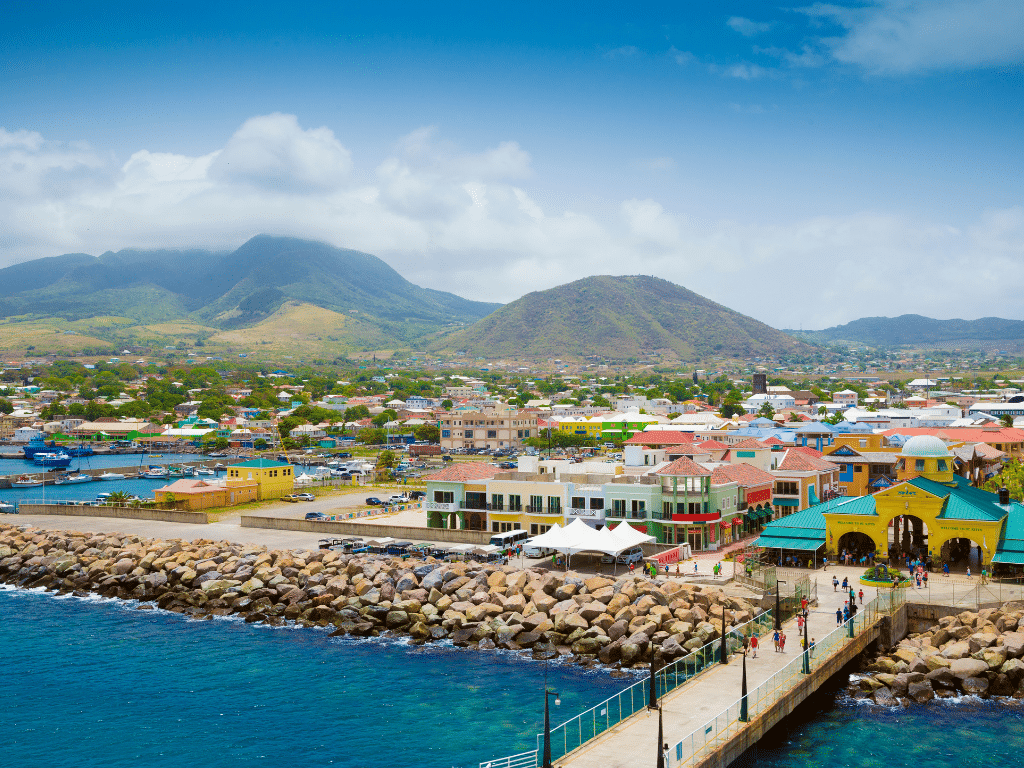- Miami
- Lisbon
- Dublin
- Dubai
- Cebu
Insights
Saint Kitts and Nevis is one of many Caribbean island nations that offer citizenship-by-investment (CBI) programs, and has, in fact, the world’s oldest CBI program.
The dual-island nation began offering citizenship by investment all the way back in 1984, and consequently has one of the most carefully-considered and robust CBI programs in the world. It has historically offered visa-free (or visa-on-arrival) access to more than 160 countries, and the country’s generous tax regime meant that high-net-worth individuals seldom lose significant portions of their income to arbitrary taxation.
In February 2023, Saint Kitts and Nevis made several changes to their CBI program. Most of these changes are favorable to the CBI applicant, so it’s largely good news all around.
Saint Kitts and Nevis have made the recent changes in a bid to ensure that their CBI program remains competitive and serves the needs of CBI applicants. The new changes ensure that Saint Kitts and Nevis remains an attractive destination for high-net-worth individuals who are looking to diversify their options with a second citizenship.
In order to facilitate this fresh approach, Saint Kitts and Nevis have instituted a new regulatory body to oversee CBI applications. The Citizenship by Investment Unit (CIU) Board of Governors is now responsible for overseeing all applications, as well as assessing the ongoing effectiveness of the country’s CBI policy.
Let’s take a look at each of the changes made to the process of obtaining a Saint Kitts and Nevis passport, and what they mean for potential applicants.
In a welcome change for applicants who wish to ensure that their grandparents are also afforded Saint Kitts and Nevis citizenship, the minimum age for grandparents included as part of an application is now 55, down from 65.
One of the biggest – and most welcome – changes to obtaining St. Kitts & Nevis citizenship has come in the form of the newly-accelerated (and discounted) donation to the SGF.
For a limited period (9th February – 30th June 2023) there is a flat $25,000 reduction in the required donation amount to the SGF – no matter how many dependents are included in your application. The discounted prices are as follows (all prices are in USD):
In addition, until June 30th 2023, applications will be processed in 60 calendar days, rather than 90.
The due diligence fees that the applicant will be required to pay depend on when the application is made, and how quickly they wish for their application to be completed.
If applying during the discounted/accelerated period from January-June 2023 – or applying after this time, using the normal 90-day processing period – the due diligence fees are as follows:
If applying using the expedited 60-day system after June 30th 2023, due diligence fees are:
In addition, if using the accelerated application process after June 30th 2023, the following post-application fees apply:
There have been some major changes in how real estate investment works in Saint Kitts and Nevis. Firstly, anybody who previously enjoyed status as a government-approved project needs to reapply for that status.
In order to purchase a share of an ongoing real-estate project, applicants need to invest at least $200,000 into the project. If purchasing a private residential property, it must be valued at a minimum of $400,000.
There has been a fairly major change to the resale period on private residential properties, however; previously, applicants were required to hold the property for a period of at least seven years before reselling. That has been reduced to a period of five years as of 2023. Real-estate investments remain the same, and still require the investor not to resell for at least seven years.
There are a few caveats when it comes to private residential properties, however; the value of the land is not factored into the value of the property, and the property is always considered to be a single property (even if it was, say, later converted into multiple condominiums). It also cannot be sold to another CBI applicant.
The same due-diligence fees apply for real-estate and residential property investments; additionally, if submitting an accelerated application, the same accelerated post-application fees apply as in the case of an SGF application.
This new investment option replaces the old “Alternate Investment Option” that Saint Kitts and Nevis previously offered, and is the brainchild of the new CIU Board of Governors.
Under the AIO, investors would make a payment to the government, which would then use that capital to develop infrastructure projects. Under the PGIO, however, the payment is made to an Approved Public Benefactor, rather than directly to the government.
The amount payable under the PGIO is the same as the old AIO amount -- $175,000. However, whereas in the past you’d have been required to add $10,000 for each dependent (and $20,000 for each sibling), now it’s simply a flat $175,000 no matter how many dependents are included.
However, there are additional fees that apply – and that scale with the number of dependents. Due diligence fees for non-accelerated applications follow the same structure as those for SGF contributions, and accelerated ones are similarly higher priced.
There are also post-application fees in both accelerated and non-accelerated cases. The accelerated fees are:
In non-accelerated applications, the following fees apply:
Overall, owing to the fact that the PGIO fee doesn’t scale with the number of dependents included on the application, and the fact that due-diligence and post-application fees remain unchanged, the PGIO is the cheaper option for investors.

The changes in the processes and investments required to obtain Saint Kitts and Nevis citizenship may initially appear to be complex and daunting, but in actuality the changes that have been made are rather simpler – and almost overwhelmingly of benefit to potential investors.
There remain, as before, four potential paths towards becoming a Saint Kitts and Nevis citizen by investment. The alterations to the SGF program are very welcome, reducing as they do all application paths – whether solo, as part of a married couple or as someone with multiple independents – by a flat $25,000. This means that if you’re a solo investor, you need only pay $125,000 and get your application expedited from 90 days to 60 – provided you apply before the end of June 2023.
Real estate investment remains largely unchanged – at least on the applicant’s side – but does now have the welcome addition of a reduction in the holding period for residential properties. If you’d rather sell off your residence sooner rather than later, the new 5-year holding period is a big reduction from the previous 7-year one.
If investing in non-residential real estate, however, then things remain largely unchanged from how they were prior to the 2023 amendments.
Finally, the change from the old AIO system to the CIU’s new PGIO has a few implications for those with a lot of dependents included on their Saint Kitts and Nevis CBI applications. Rather than having to pay a supplementary fee per additional dependent, you’ll simply pay a lump sum upfront (along with the usual due-diligence and post-application fees). This makes it much more affordable than it was under the old AIO system, and so perfect for larger families.
And speaking of larger families – the age reduction for eligible grandparents, from 65 to 55, makes it even easier to bring your loved ones along with you when the time comes to invest in a Saint Kitts and Nevis passport.
The time, then, has never been better to apply for a second citizenship by way of Saint Kitts and Nevis. Remember that if your application is made before the end of June 2023, you’re not only looking at a substantial reduction in costs – you’re looking at a processing period of around 2 months, rather than 3.

The changes in the processes and investments required to obtain Saint Kitts and Nevis citizenship may initially appear to be complex and daunting, but in actuality the changes that have been made are rather simpler – and almost overwhelmingly of benefit to potential investors.
There remain, as before, four potential paths towards becoming a Saint Kitts and Nevis citizen by investment. The alterations to the SGF program are very welcome, reducing as they do all application paths – whether solo, as part of a married couple or as someone with multiple independents – by a flat $25,000. This means that if you’re a solo investor, you need only pay $125,000 and get your application expedited from 90 days to 60 – provided you apply before the end of June 2023.
Real estate investment remains largely unchanged – at least on the applicant’s side – but does now have the welcome addition of a reduction in the holding period for residential properties. If you’d rather sell off your residence sooner rather than later, the new 5-year holding period is a big reduction from the previous 7-year one.
If investing in non-residential real estate, however, then things remain largely unchanged from how they were prior to the 2023 amendments.
Finally, the change from the old AIO system to the CIU’s new PGIO has a few implications for those with a lot of dependents included on their Saint Kitts and Nevis CBI applications. Rather than having to pay a supplementary fee per additional dependent, you’ll simply pay a lump sum upfront (along with the usual due-diligence and post-application fees). This makes it much more affordable than it was under the old AIO system, and so perfect for larger families.
And speaking of larger families – the age reduction for eligible grandparents, from 65 to 55, makes it even easier to bring your loved ones along with you when the time comes to invest in a Saint Kitts and Nevis passport.
The time, then, has never been better to apply for a second citizenship by way of Saint Kitts and Nevis. Remember that if your application is made before the end of June 2023, you’re not only looking at a substantial reduction in costs – you’re looking at a processing period of around 2 months, rather than 3.
Get in touch to discuss how we can help you with your citizenship or residency by investment goals. One of our investment migration experts will contact you to discuss your case. With over 16 years of combined experience our team has helped hundreds of families achieve freedom.
121 Alhambra Plaza
Suite 1029
Coral Gables, FL 33134
USA
Office 134
The Chase
Sandyford Industrial Estate
Dublin, Ireland
5 Rua do Carmo
3rd Floor
1200-093 Lisbon
Portugal
Office No. 1911
B2B Tower
Marasi Drive
Business Bay
Dubai, UAE
Level 11, Unit 1
AppleOne Equicom Tower
Cebu Business Park
Cebu City, Philippines
© 2025 Vancis Capital. All right reserved